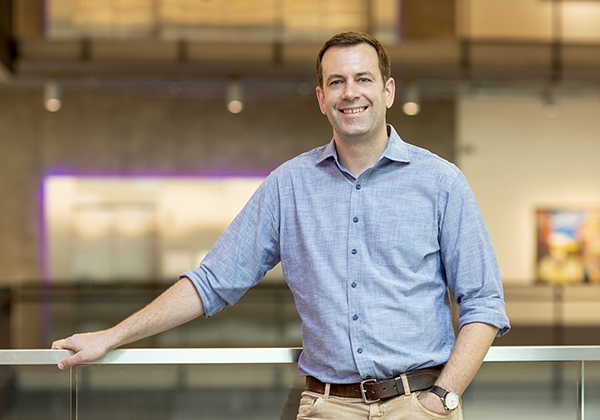Allen School professor Byron Boots was recognized with an Early Career Award at the Conference on Robotics: Science & Systems (RSS 2020) for his work spanning machine learning, artificial intelligence and robotics. Each year, the RSS Foundation selects one or more early career researchers for the honor based on their outstanding research accomplishments and demonstrated potential to advance the field of robotics. Boots, who directs the Allen School’s Robot Learning Laboratory, focuses on the development of theory and systems that tightly integrate perception, learning and control to enable new capabilities in motion planning, high-speed navigation, robot manipulation, and more.
Among Boots’ major contributions to date was the Gaussian Process Motion Planner (GPMP), an efficient, gradient-based algorithm that represents motion planning as continuous-time trajectories. He and his colleagues designed GPMP to address limitations associated with two strategies that, at the time, represented the state of the art in motion planning. The first, sampling-based algorithms, tend to require post-processing or the addition of optimal planners that are computationally inefficient in responding to high-dimensional problems with challenging constraints; the second, trajectory optimization algorithms, require fine discretization to integrate cost information under certain constraints and are themselves costly to rerun when faced with changing conditions. GPMP overcame such computational inefficiencies while maintaining smoothness in the result. It also served as the foundation for GPMP2, an extensible algorithm that treats the problem of motion planning as one of probabilistic inference. Under this approach, GPMP2 uses factor graphs to compute a more efficient solution. Boots and his collaborators extended GPMP2 to an incremental algorithm, iGPMP2, capable of efficiently replanning trajectories as conditions change. This combined work earned the team Paper of Year from the International Journal of Robotics Research in 2018.
The following year, Boots and his colleagues presented a novel online learning-based framework for model predictive control, a powerful technique for optimizing control tasks in dynamic environments. As part of that work, they devised a new algorithm, Dynamic Mirror Descent Model Predictive Control (DMD-MPC), that can be applied to a variety of settings and cost functions. The team’s approach, which earned Best Student Paper and was a finalist for Best Systems Paper at RSS 2019, was yet another example of Boots’ keen interest in advancing robot learning in ways that combine new levels of flexibility with increased efficiency.
“Machine learning offers huge potential for robots to learn dynamically by interacting with their environments instead of requiring any new functionality to be hand-designed by engineers. But that level of flexibility and adaptability can come at a high cost,” Boots explained. “Machine learning algorithms are notoriously data-hungry as well as computationally expensive. My goal is to leverage a mix of machine learning and prior knowledge to accelerate robot learning for real-world applications while making the process more efficient and scalable.”
One of those real-world applications Boots is particularly keen to accelerate is high-speed navigation. He recently secured a grant from the United States Army Research Laboratory as part of its Scalable, Adaptive and Resilient Autonomy (SARA) program aimed at expediting research in autonomous mobility and maneuverability in complex, unknown and adversarial environments. The grant will support Boots’ work, alongside Allen School colleagues Dieter Fox and Siddhartha Srinivasa and collaborators at the Georgia Institute Technology, to develop new capabilities in perception, planning and model predictive control that will enable autonomous ground vehicles (AGVs) to operate safely and fluidly under dynamic conditions involving a variety of obstacles and terrain.
Boots joined the Allen School faculty in 2019 after five years as a professor at Georgia Tech’s School of Interactive Computing. He was no stranger to the University of Washington, having previously completed a postdoc working with Fox in the Allen School’s Robotics and State Estimation Lab after earning his Ph.D. from Carnegie Mellon University. Boots has published nearly 100 peer-reviewed papers and his work has earned recognition at many of the top conferences in the field, including RSS, the International Conference on Machine Learning (ICML), International Conference on Robotics & Automation (ICRA), International Conference on Artificial Intelligence and Statistics (AISTATS), Conference on Neural Information Processing Systems (NeurIPS).
“It was already clear during his postdoc at UW that Byron would become a trailblazer in robotics and machine learning,” said Fox. “The RSS Early Career Award is only given to a very small group of the most innovative and influential researchers in robotics, and I can’t think of anybody more deserving of this honor than Byron.”
Boots and his fellow Early Career Award recipients — Luca Carlone of the Massachusetts Institute of Technology and Jeannette Bohg of Stanford University — were formally honored during the RSS 2020 conference held online this week.
Congratulations, Byron!


